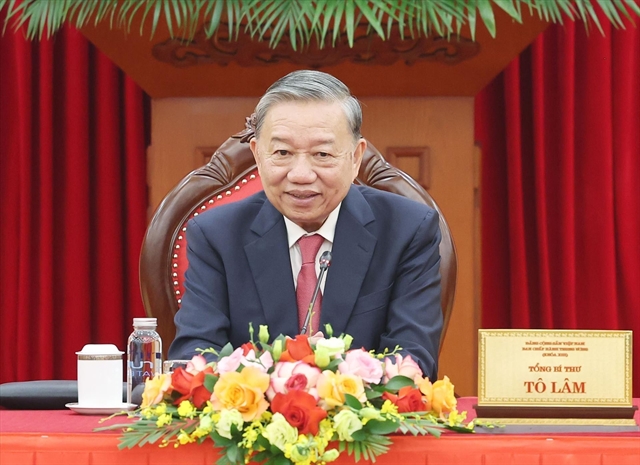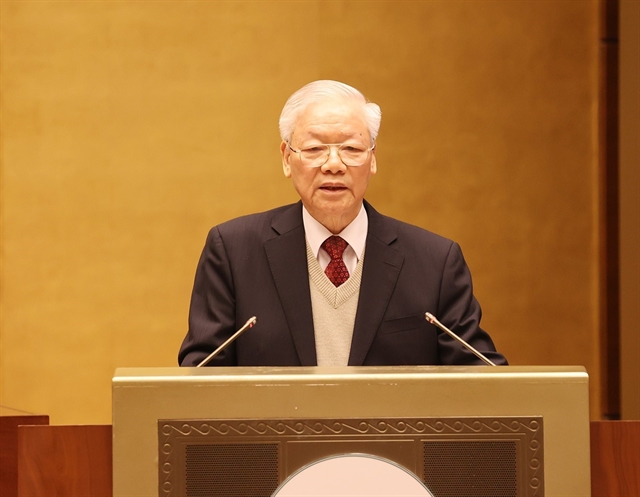 Politics & Law
Politics & Law

Party General Secretary Nguyễn Phú Trọng has told the diplomatic sector to inherit the flexible and creative but still fierce and resilient foreign policies applied by late President Hồ Chí Minh.

|
| Party General Secretary Nguyễn Phú Trọng delivers a speech at the first National Foreign Affairs Conference. — VNA/VNS Photo |
HÀ NỘI — Party General Secretary Nguyễn Phú Trọng has told the diplomatic sector to inherit the flexible and creative but still fierce and resilient foreign policies applied by late President Hồ Chí Minh.
He was speaking at the first National Foreign Affairs Conference held in both in-person and virtual forms on Tuesday.
This is the first time a symposium on external affairs has been organised since the establishment of the Party and the birth of the Democratic Republic of Việt Nam.
It aims to thoroughly promote the Resolution of the 13th National Party Congress, especially policies, guidelines and orientations regarding foreign affairs of the Party, people and army.
General Secretary Trọng said over the past 90 years, under the leadership of the Party and President Hồ Chí Minh, on the foundation of creatively applying the basic principles of Marxism-Leninism, inheriting and promoting the external affairs tradition and identity, as well as diplomacy and national culture, selectively absorbing world culture and progressive thoughts of the times, Việt Nam has built up unique diplomacy of the Hồ Chí Minh era, which is called ‘bamboo diplomacy’.
Inheriting the bamboo’s characteristics of being solidly rooted but having flexible branches, ‘bamboo diplomacy’ refers to foreign policies which are flexible, changeable to each situation and creative but still fierce and resilient ahead of challenges.
The Party chief said after 35 years of đổi mới (renewal), our country’s position and power have changed. Việt Nam must “raise a stronger voice and show a more active foreign policy stance, first of all in the region” and promote innovation to expand into new fields, seek new partners, and take new directions.
Innovation must be on the basis of upholding principles, certainty, prudence, steadfastness in goals, and sincerity and humility, he said.
He asked the diplomatic sector to continue to thoroughly grasp and properly implement the foreign policy of independence, self-reliance for peace, cooperation and development as well as multilateralisation and diversification, as well as active international integration for national interests.
One of the key requirements is to always be patient, calm, lucid and smart, properly handle foreign relations, including sovereignty and territorial matters, he said, adding that this is a very important task of the whole political system, in which the diplomatic sector is the leader.
He stated that it is necessary to maximise all favourable factors of the country in order to contribute to building and shaping multilateral mechanisms, and implementing Directive 25-CT/TW on promoting and elevating multilateral external relations towards 2030.
The development of a master strategy on multilateral foreign affairs towards 2030 is considered an important strategic orientation, he said.
He urged the diplomatic sector to expand and improve the efficiency of foreign affairs work, especially in political, security-defence, economic, cultural cooperation while maintaining collaboration with other countries, giving priority to stability and promoting political trust, addressing differences and issues arising in the spirit of cooperation, friendship, control of disagreements, based on international law and regional practices.
The diplomatic sector has been also asked to improve the efficiency of economic diplomacy serving the country's sustainable development, and promote the implementation of overseas Vietnamese work.
He noted that the diplomatic sector needs to pay attention to strategic research and forecasting, focusing on carefully assessing trends in policy and relations between major countries, neighbouring countries, as well as political, economic, and socio-cultural trends in the world and in the region, especially in the face of impacts of the Fourth Industrial Revolution, digital transformation, digital economy, digital society and the dangers of epidemics and climate change.
He also highlighted the importance of training diplomats and foreign affairs officers in terms of qualifications, capacity and political bravery.
Three-pillared diplomacy
Delivering a report on the situation, orientation and key foreign affairs tasks to promote the 13th Party Congress’ Resolution, Politburo member and Standing Deputy Prime Minister Phạm Bình Minh highlighted the necessity to build a comprehensive and modern diplomatic sector based on three key pillars of Party, State and people-to-people diplomacy.
This contributes to the successful implementation of the country's development goals and the foreign policy set out by the 13th National Party Congress.
Along with that, he emphasised the need to ensure the Party's leadership, the State's centralised management of foreign affairs and international integration as well as thoroughly promote and implement foreign policies of the 13th National Party Congress through strategies, plans, programmes, projects on foreign affairs and international integration.
“The objective of foreign policy is to take determination to ensure the highest interests of the nation on the basis of basic principles of the United Nations Charter and international law, equality, cooperation and mutual benefits.
“The foreign policy direction is to proactively, synchronously, creatively and effectively conduct foreign affairs activities, including Party diplomacy, State diplomacy and people-to-people diplomacy, diplomacy at all levels, sectors and localities,” he said.
“The basic task is to continue promoting the pioneering role of foreign affairs in creating and maintaining a peaceful and stable environment, mobilising external resources for national development and defence, elevating the position and prestige of the country,” the Deputy PM said.
It is also important to closely combine foreign affairs and national defence-security to create a firm foothold, maintain the national sovereignty and territorial integrity as well as mobilise external resources for national development, he said.
He noted that the 13th National Party Congress defined the need to continue to constantly implement the foreign policy of independence and self-reliance for peace, friendship, cooperation and development, as well as multilateralising and diversifying external relations, and being a friend, a reliable partner and a proactive and responsible member of the international community.
The Deputy PM proposed more effective and creative multilateral foreign affairs work, contributing to building and shaping multilateral institutions and political-economic order, especially ASEAN, the United Nations, international and regional inter-parliamentary cooperation mechanisms (such as AIPA, IPU), APEC, Mekong sub-regional cooperation, as well as in international issues of strategic importance, in accordance with the requirements, capabilities and conditions of Việt Nam.
New strategic period
Minister of Foreign Affairs Bùi Thanh Sơn said together with the country’s development, the diplomatic sector was entering a new strategic period.
The foreign policies set out by the 13th National Party Congress, which focus on building a comprehensive and modern diplomatic sector based on three pillars of Party, State and people-to-people diplomacy, “reflects the maturity of Việt Nam’s revolutionary diplomacy, and are also a new strategic, long-term and urgent requirement for the sector in the new national development period,” Sơn said.
Regarding orientations of foreign affairs in the future, he proposed closely combining political diplomacy, economic diplomacy, cultural diplomacy, external information, overseas Vietnamese work and citizen protection; taking full advantage of sound political relations, favourable international factors, international agreements to mobilise external resources, effectively combined with domestic resources for growth innovation towards sustainable and inclusive development, industrialisation and modernisation, and strengthening national synergy.
Besides traditional fields, the diplomatic sector will actively seek new directions in new fields such as technology diplomacy, digital, environmental, health diplomacy and energy diplomacy in order to meet the needs of the country's development in the new period.
Importance of Party and people-to-people diplomacy
Head of the Party Central Committee’s Commission for External Relations Lê Hoài Trung emphasised the importance of Party and people-to-people diplomacy.
According to him, Party diplomacy serves as a pillar in the overall strategic foreign policy orientation, enhances trust, and creates a solid political foundation for Việt Nam's relations with other countries.
He also affirmed the pivotal position of people-to-people diplomacy in building and strengthening the social foundation for relations between Việt Nam and other countries and call for consensus of overseas Vietnamese.
Through Party diplomacy and people-to-people diplomacy, Việt Nam can boast international understanding and support for the cause of renovation, national construction and defence, he said. — VNS